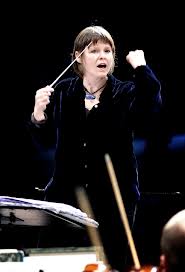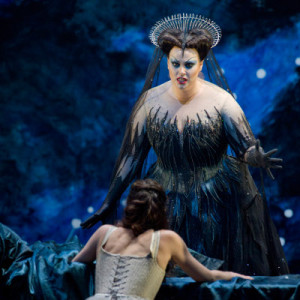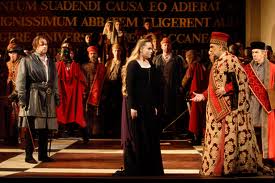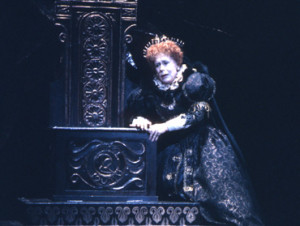Reviews from the Spring Season at Royal Opera House, Covent Garden
My excuse is that spring has been late arriving and ergo my reviews are late blooming as opposed to bloomin’ late. This Spring and Summer season is full of very exciting and intriguing productions. Not least the last two operas in July: Verdi’s Simon Boccanegran the remastered version from Verdi’s last period of musical composition in the 1880’s. The rewrite of Act I is almost entire and culminates in one of the most extraordinary dramatic climaxes in the genre of what we might today term ‘grand opera’ – the scene in the great council chamber. Also in July perhaps the most rarely performed of the Britten operas – Gloriana.
Gloriana was commissioned for the coronation year of 1953 when the talk was of a second Elizabethan Age. I guess the Opera House expected to get the Armada portrait set to music. Instead Britten gave them something that is much less comfortable and much more real. He set the opera in the glittering court of Elizabeth’s declining years. It is a story about appearances and deceptions. No deception is greater in this world of reflected glory than the old queen’s refusal to come to terms with her lost youth. Her delusions are pursued to the point of the absurd and then tragically beyond in her long-running affair with the handsome, vainglorious, shallow and impulsive Earl of Essex.
Britten sour take on the the Elizabethan vintage did not sit well with Coronation Britain in 1953 and has never since. Yet it’s an opera full of remarkable music and rich in psychological insight. It asks many awkward questions about myths of history and mirrors of youth. It closes with the spectacular dramatic device of using the audience as Elizabeth’s audience in 1601. The old bewigged bejeweled queen moves front stage to deliver the famous golden speech. Elizabeth’s words sparkle with rhetorical devices commonplace in the times and commonly used to the same effect by all her immediate predecessors. But History had judged her words to be ‘golden’ though as a historian I’m with Britten in his judgement of Elizabeth and with Shakespeare in observing that all that glisters is not yet gold.
To be a King, and weare a Crown, is a thing more glorious to them that see it, then it is pleasant to them that beare it: for my selfe, I neuer was so much inticed with the glorious name of a King, or the royall authoritie of a Queene, as delighted that god hath made me His Instrument to maintaine His Truth and Glorie, and to defend this Kingdome from dishonour, dammage, tyrannie, and oppresion; But should I ascribe any of these things vnto my selfe, or my sexly weaknesse, I were not worthy to liue, and of all most vnworthy of the mercies I haue receiued at Gods hands but to God onely and wholly all is giuen and ascribed. – (Elizabeth I address to parliament in 1601)
Before we get to glittering end I must comment on three others jewels of this season. First, the revival of the Magic Flute.
Die Zauberflote W. A. Mozart
Julia Jones, Conductor
David McVicar, Director
Ekaterina Siurina, Soprano: Pamina
Charles Castronovo, Tenor: Tamino
Christopher Maltman, Baritone: Papageno
Susana Gaspar, Soprano: Papagena
Albina Shagimuratova, Soprano: Queen of the Night
Brindley Sherratt, Bass: Sarastro
Sebastian Holecek, Bass: Speaker (der Sprecher)
Peter Hoare, Tenor: Monostatos
I first saw Magic Flute in Leeds Grand Theatre in 1975. This was long before the birth of English National Opera North. I was an opera virgin in those days. These days I’m a bit of a camp follower. consequently. this production is not new to me. I’ve seen in several times. I like it but I’ve liked others more. Mozart’s and Schikaneder’s opera is a cross between fairy tale and parable. It has been interpreted in as many ways by as many directors. There was Peter Sellars’ disastrous Glyndebourne LA freeway version; Julie Taymor’s Lion King spin-off; various “traditional” versions which play up the pantomime to varying degrees. One of my favourites was Glyndebourne’s 1980’s production with sets by David Hockney. My other the ENO production from the 1990’s with Papageno and Papagena in a nest with chicks for their final duet. In between there’s been many in between productions. I’ve yet to see one when the trials by fire etc live up to their potential for staged effect. This one by McVicar doesn’t change that. There is another new one for ENO this autumn….opportunity knocks as Hughie Green once opined.
David McVicar’s production takes Mozart’s Flute seriously if sometimes too seriously. The comic aspects of this singspiel are vital to the integrity of the concept. McVicar strays too much into the Masonic rituals and too far from the fairy tale. This is simply a story of of good triumphing over evil. Its point is that what appears good isn’t; and what appears evil isn’t. Appearances may be deceptive and the wicked abuse power to keep this deception alive. That said McVicar’s production has the value of giving is a rounded prince in a Tamino we take seriously – as he should be taken judging from Mozart’s music gave him. However, as with say Taming of the Shrew, women in the Flute generally occupy a lesser place than men. Indeed the Queen of the Night is out of control and out of place precisely because she doesn’t know her proper place. Instead, she asserts female unreason to govern a world best left to the calm judgement of male reason.Mozart simply reflected the prejudices of his time and of his audiences. However, it is to the women Mozart gives his best music. And it is on that we the modern audience must reflect rather than upon the patent absurdities of the story.
The set is simple; ideally flexible; beautifully lit and complements serious vision McVicar’s vision. The larger elements creak and squeak in a distracting way. This also happened in my the Meyerbeer last December and the Donna del Lago and Don Carlos last month. There were moments of fabulous beauty particularly with the first Queen of the Night scene and the rising sun in the finale. As light was the metaphor of the philosophes; this sunrise is in Mozart’s terms the dawn of the new age of Enlightenment.
 Julia Jones made welcome return after her 2010 Così. She conducted to great effect playing up to the big moments but there was delicacy and charm in her music-making too.The orchestra responded well to her fine touch with excellent playing throughout. This cast was interesting since it compliments McVicar’s grand conception with bigger voices than usual for a Mozart opera.
Julia Jones made welcome return after her 2010 Così. She conducted to great effect playing up to the big moments but there was delicacy and charm in her music-making too.The orchestra responded well to her fine touch with excellent playing throughout. This cast was interesting since it compliments McVicar’s grand conception with bigger voices than usual for a Mozart opera.
Most notably was the Tamino of Charles Castronovo. Castronovo sings plenty of Mozart roles, mid period Verdi and lighter Puccini. As a consequence this Tamino is striking – instead of coming over as lightweight fairytale prince Castronovo’s Tamino is genuinely heroic in the manner say of Aragorn in Lord of the Rings. He also can act. In the scene where he is unable to speak to Pamina there was genuine pathos because you felt for his dilemma. The downside was that Castronovo found some of the fleet passages like the Flute aria were beyond this vocal skill. But he looked and otherwise sounded the business….what more can one want? Castronovo is an ostentatiously handsome presence onstage and in time he will surely thrill in one of Verdi’s grander roles.
 Ekaterina Siurina was a similarly unconventional Pamina. More like to Susanna in the Marriage of Figaro this Pamina was far removed from the traditional hapless victim of bizarre circumstance. In this sense the two make characters more sense of the love interest at the heart of the plot. This is not always readily achieved. Siurina’s voice is beautiful reminiscent of Lucia Popp in this role. “Ach, ich fühl’s” in Act II was beautifully phrased and her restraint in adversity was courtly restraint, echoes of Penelope, which is actually the right note to strike rather than the overwrought Romantic heroine to which we are usually treated. Therefore, the scene with the Armed Men leading the lovers into the Trials was musically the high point of the evening with rapturously graceful singing from both Castronovo and Siurina.
Ekaterina Siurina was a similarly unconventional Pamina. More like to Susanna in the Marriage of Figaro this Pamina was far removed from the traditional hapless victim of bizarre circumstance. In this sense the two make characters more sense of the love interest at the heart of the plot. This is not always readily achieved. Siurina’s voice is beautiful reminiscent of Lucia Popp in this role. “Ach, ich fühl’s” in Act II was beautifully phrased and her restraint in adversity was courtly restraint, echoes of Penelope, which is actually the right note to strike rather than the overwrought Romantic heroine to which we are usually treated. Therefore, the scene with the Armed Men leading the lovers into the Trials was musically the high point of the evening with rapturously graceful singing from both Castronovo and Siurina.
I enjoyed less Christopher Maltman’s vulnerable Papageno. There’s much to be admired in allowing comedy to rise naturally from character rather than situations but the opera is written with its obvious sight-gags and these latter are after all the props of the clown and it is in his clowning that we see Papageno’s vulnerability. In this way he is less of a Shakespearean fool and more of the clowning of Everyman. This is why we as an audience take him and his need for a Papagena to our heart. He sang with great beauty and craft.
 I had read the reviews of Albina Shagimuratova playing the Queen of the Night. This role is one beloved by audiences and is usually played by light agile sopranos suited to negotiate the treacherous rapids of range and coloratura. That voice is often unable to convey the malice of the Queen. Shagimuratova’s large voice crystal clarity and vocal attack cuts a menacing figure. Inevitably her performance was not fluid in the arpeggios of running notes in the upper range. Some of the passages requiring delicate agility were lost as she ran out of steam particularly and evidently in the closing of “Der Hölle Rache”. Yet she was astonishing in the high F section. She was more impressive in the Queen’s Act I aria. She is a voice to watch.
I had read the reviews of Albina Shagimuratova playing the Queen of the Night. This role is one beloved by audiences and is usually played by light agile sopranos suited to negotiate the treacherous rapids of range and coloratura. That voice is often unable to convey the malice of the Queen. Shagimuratova’s large voice crystal clarity and vocal attack cuts a menacing figure. Inevitably her performance was not fluid in the arpeggios of running notes in the upper range. Some of the passages requiring delicate agility were lost as she ran out of steam particularly and evidently in the closing of “Der Hölle Rache”. Yet she was astonishing in the high F section. She was more impressive in the Queen’s Act I aria. She is a voice to watch.
Brindley Sherratt was a forceful Sarastro.The “O Isis und Osiris” was particularly beautiful. Sebastian Holecek was a effective as the Speaker. The three ladies of Anita Watson, Hanna Hipp and Gaynor Keeble were strong both in presence and vocally. The boys, played as three Just Williams sang well for their supper but their parts seemed underpowered now in comparison to the bigger voices on stage. That was a clear disadvantage in selecting such a cast. they were played by Archie Buchanan, Filippo Turkheimer and Luciano Cusack.
There we have it a Flute that wasn’t flighty but in revealing some things obscured others. I still think there needs to be more Magic in this Opera than modern tastes commonly allow. We need more fireworks and less philosophy.


